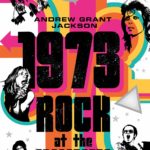Andrew Grant Jackson’s 1973: Rock at the Crossroads stuffs a dizzying amount of details into his account of this most pivotal year not only in music, but as well in the world’s political, social, and economic strata. The colorful threads he chooses to align, woven together, form a discernibly comprehensive and decadent design when viewed from a distance- certainly he makes his case for 1973 as a more-than-worthy candidate for a look back- but examined up close it’s almost mind-numbing how it all connected; such as seemingly incidental couplets like changes in U.S oil policy being consequential to the future of the LP as a medium, as just one example.
If it sounds prohibitively academic, it isn’t. Jackson is a master tailor of the tales and the tidbits, though, at times, the sexuality of the era- with a particular emphasis on David Bowie- seems to hold his attention disproportionately to some of the music. Yet, it’s also where Jackson shines, allowing his chronicle to indulge in sex, drugs, and rock-and-roll, and politics, and economics, and religion (including a winking acknowledgement of Sammy Davis Jr.’s sympathy for Satan worship). It’s laid out chronologically, moving through the calendar, stopping to devote full chapters to the more significant albums and artists, but is by no means restrictive. Pre and post ’73 causes and effects are suggested and argued here, as well.
Jackson relies heavily on both Rolling Stone and Billboard as his arbiters of the lasting impact of ‘73’s output, citing chart positions and “Best Of” lists for affirmation. He also extracts contemporaneous quotes (from previously published material), keeping the reader in the moment the thought was verbalized, rather than asking those concerned for their retrospective feelings on the era, likely to be sanitized or hazy. That’s a key choice he’s made in accurately and more interestingly returning to the past, and just one of several exceptionally smart moves in a winning effort. Jackson’s latest is a book so abundant in fact and feelings it can serve equally as an entertaining trip back in time and an all-knowing reference source for, perhaps, the last truly triumphant year in rock-and-roll.



No Comments comments associated with this post